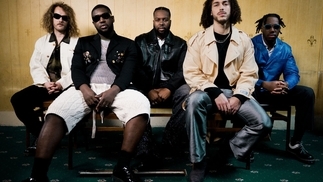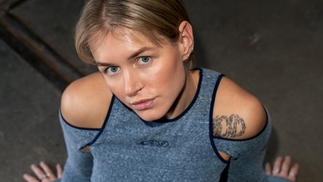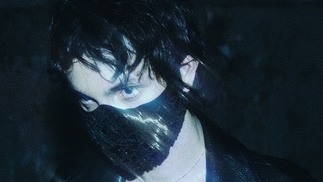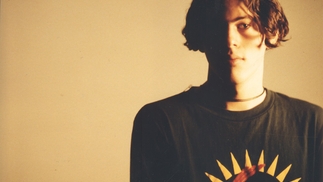PLANET PAN-POT: WE MEET TECHNO'S PITCH-BLACK TAG-TEAM
We peer inside the world of Pan-Pot...

Some things in life just happen; the stars align or elements combine for a perfect chemical reaction. That's Pan-Pot. Meeting in their early 20s by chance in 2003 at Sound & Audio Engineering school (SAE) in Berlin, the duo immediately established a bond like no other.
“It's hard to find someone who you have such an understanding with...” Tassilo, one-half of the DJ/production duo, tells DJ Mag in a tatty upstairs room of North London club Egg London, the commotion below building to a rumbling hubbub of Flipside speaker stacks, general smoking area murmur and the odd excited chirp.
“You have a friend who you like a lot,” adds Thomas, who has no qualms finishing his sidekick's sentence — a tacit call and response that's one of their many trademarks.
Labels, tracks and world famous DJ sets aside, it's this rapport that defines the Pan-Pot partnership — and not because it's the pre-rehearsed script of a greasy PR campaign. No, there's an ease to these two that feels totally genuine, even if there is a considered, water-tight plan in place behind them these days.
Since springing up in 2005 with their first EP on Mobilee alongside original founding member Marco Resmann ('Popy & Caste') — who left the outfit early on — they've released two studio albums, a compilation series for Mobilee and an extensive back-catalogue of EPs, primarily as a tech-house act with a minimal touch. More recently, however, their Second State brand has emerged as one of the titanic new forces in techno.
Partly down to the release of their second studio album 'The Other' last September and the corresponding remix LP on the Second State Audio label, featuring techno royalty like Carl Cox, Nicole Moudaber and Joseph Capriati, the duo have set out their stall as one of the most defining names in pitch-black, big-room sounds in recent years.
At the time of writing, next for Second State is a warehouse party organised by London Warehouse Events (LWE) and The Hydra with Miss Kittin at Studio Spaces E1 at the end of March. They're regular headliners alongside the likes of Adam Beyer, Alan Fitzpatrick and Ben Klock at gargantuan techno events like Awakenings, Time Warp and Drumcode, and residents at Watergate, Amnesia (Hyte) and Output, New York, among others.
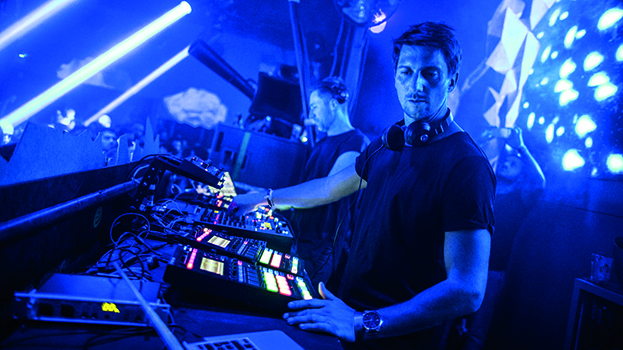
TECHNO
As a DJ act, they're truly international, the face of techno today and a headline booking force to be reckoned with from Europe to US to South America.
Tonight is testament to it. Booked by us for a one-off London show at DJ Mag Sessions at Egg London, we've sold something close to 1000 pre-sale tickets and the queue around the block isn't going anywhere — people outside are here for one act only, and more than willing to wait.
“We really like to play in London,” explains Tassilo. “We've played more in the UK in the last year or two years. Before that, our profile was not as big here because we didn't really focus much on it. It was always fun playing in London, but nowhere near how it is now!”
Since striking up a partnership with LWE, the duo have, as Tassilo puts it, “kinda falen in love with London again” as they've felt more comfortable in their surroundings, and as a result their reputation has rocketed in the UK. Earlier in their career they found themselves restricted by club shows with ill-fitting line-ups. “We played at clubs like Fabric and stuff like that,” Tassilo adds, “but our profile wasn't big enough and our music wasn't right at the time."
Taking control of their own shows has allowed them to craft and cultivate their sound on their own terms in the capital, and this transition doesn't apply to London alone. The past three years have seen the duo undergo a period of reinvention as they've shaken off their Mobilee tag to create their own brand and delve deeper into the darker, more driving territory that we know them for today.
While Second State has served as a vehicle for this change — a sort of hub for it — it's also their energetic DJ sets at festivals and large-scale club events across the world that have allowed them to become such nascent stars of their scene.
“We were together with Mobilee for 10 years, and after eight years we felt that musically it was going in a different direction,” admits Tassillo. “Mobilee is now more tech-house, deep house stuff — they are moving more into techno again now — but we also went in the direction of techno and we started feeling like it'd be nice if we have our own label brand and develop something on our own...”
“To give something back to other artists,” adds Thomas, referencing Second State Audio's role in blooding new talent and providing a platform for emerging artists.
MOBILEE DISCO
Pan-Pot's legacy might trace back to the label they were once synonymous with, but Thomas and Tassilo deny they were influenced, defined even, by Anja Schneider's world-renowned imprint. Their evolution was more organic and idiosyncratic than that.
It all started with a party they threw for 100 or so people in a Berlin park a year or so after they first met at music production college. After realising they were the only two people on their course into techno — Thomas, originally from Templin, introduced his new friend to Richie Hawtin (Plastikman), while Tassilo already had a flavour for DJ Hell's International Deejay Gigolo label picked up from his home town in Bavaria — they soon realised their only chance to DJ in public would be at a party of their own because “nobody would book us obviously,” the acerbic Thomas gruffly points out.
Deciding Anja, who they didn't know at the time — known for her gigs at Love Parade and her Berlin radio show — would be a perfect booking for their little outdoor event, what followed changed their lives forever.
“This is actually how we met Anja and Ralf Kollmann from Mobilee,” Tasillo recalls. “Nobody came to the party, so we had a lot of time to talk to Anja and Ralf. That's where we talked about doing a release for the label, because they were just forming it basically, so she said as soon as we have something finished we should send it over.”
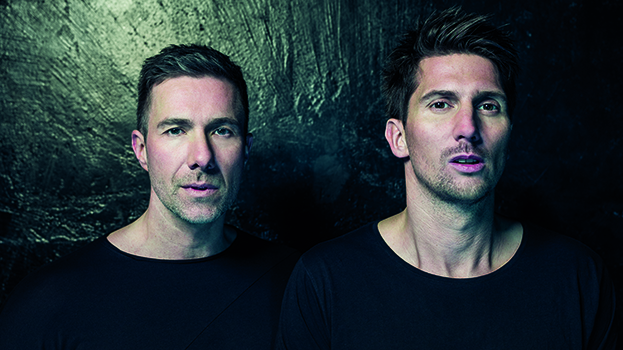
Teaming up with one half of Lunar City Express, later founder of Upon You, Marco Resmann, for their first few tracks, they had a three-track demo ready to go within two months and, before they knew it, Pan-Pot's first official release was lined up as only the second ever for Mobilee.
“It was in the beginning of this minimal techno thing,” Thomas tell us. “It was that sound, but already different to the other stuff around at the time. It had our own sound to it...”
“It was a lot of experimenting... that was the fun thing, there were no rules,” adds Tassilo, taking his turn to finish one of Thomas' points.
Made of skittish hi-hats and sharp, skipping drum patterns that slide and ricochet off one another over a sludgy, frazzled b-line, 'Popy & Caste' certainly taps the weird, wonky zeitgeist of the minimal area. However, there's an assurance — a level of conviction and braveness — to the production that, despite its rawness, hints at a production outfit looking to shake things up. Even today, you could imagine a dancefloor really losing their shit to it — it's chaotic, oddball and still stands up.
It was this streak of avant-garde audacity that set them apart from other artists on Mobilee, where an old skool-influenced house artist like Sebo K can sit just as easily alongside the techno of Exercise One and the melodic, vocal cuts of Marcin Czubala. And, as one of the early members of the label, there was no real need for them to try to fit in.
“Basically, there was no signature for Mobilee at that time,” says Tassilo. “We were part of the founding of the musical direction of the label. Back then they signed other artists, and each artist had their own style and direction.”
Basing their sound on stripped-back, sinewy textures and pulsating rhythmic tempos, it's sound design — “found sound,” Thomas points out — that also helps define the early part of Pan-Pot's output. But while the freedom they found on Mobilee allowed them to establish themselves and carve their own identity, there soon came a desire to dictate their own path — away from the constraints of a label and its music policy.
“One thing we didn't want to have was this feeling where you finish a track in the studio and then you show it to somebody who then decides if it's released or not,” explains the ever-talkative Tassilo, who comes across as the more ambitious, business-like member of the partnership compared to the slightly more reticent Thomas. “We said we don't want to be judged any more. Or we just want the freedom to do whatever we want to do; release whatever we think is good in our opinion. And that's something we try to do with our label, to give as much freedom as possible to our artists...”
“To make them feel comfortable,” adds Thomas.
IDEAL STATE
Working collegiately with artists and providing feedback within a creative community is the modus operandi of Second State Audio. One of their projects is called Hub, and the clue is in the title. It involves various artists from the label swapping styles in the studio.
Hub One involved Stephan Hinz directing collaborations with Pan-Pot and Philipp Ruhmardt, plus Clint Stewart who helped produce 'Shimmer' — a gothic prog-techno number with plenty of drama. For the next one, Clint will take creative lead for tracks with Stephan, The Reason Y and the label bosses themselves again.
“It's something to set up and big up the connection between the artists and the label,” Tassilo explains. “There is a loose music policy, we want each artist to develop his sound — techno-ish, tech-house — but what's most important is representing the label with the artist so it is not just a label to release music; it's a label we DJ with and present ourselves with. To present this family aspect is important to us.”
Finding a connection between a family of artists like this would count for nothing if it wasn't for the unique bond between Tassilo and Thomas themselves. It's the basis of everything the duo do, something best demonstrated by their energetic and infectious b2b DJ sets, which serve as the shop window for Pan-Pot — and, we would argue, the secret to their success.
For their album, 'The Other', they worked separately on tracks and brought ideas together after, but they wouldn't dream of severing duties in the booth like some DJ partnerships decide to do.
“We realised it's something special because we have this experience,” considers Tassilo. “With other people playing b2b, it's not natural.”
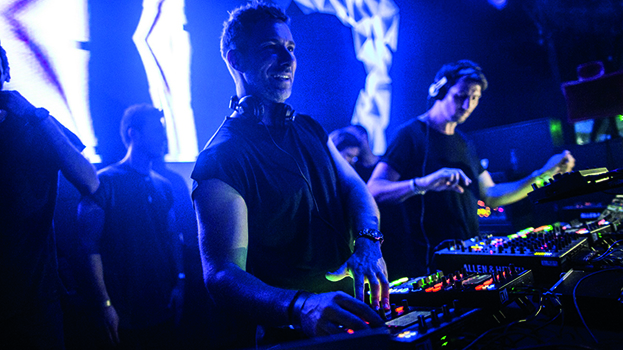
“With most other people, mixing with them, I hate it,” adds Thomas. “When someone else starts mixing, I'm like, 'What the fuck!'” He laughs.
This magic — this chemistry — makes DJing fun for the duo, and the sight of these two evidently enjoying themselves in the booth is another of their key trademarks. The energy between them transmits to the dancefloor — it's almost tangible.
“We have these moments where — even when we're banging out techno — we come to a point where we're getting into it and smiling at each other and we're like, 'You see that, it fits perfectly', and we're still like little kids, you know,” Tassilo points out.
They're not the only ones having fun. Just 30 minutes later, we're downstairs and Egg London's wide warehouse garden space is bursting at the sides. The crammed-in congregation is going categorically ballistic — hands pumping and gregarious smiles all-round. It's the pounding pace and energy of their set that really grabs DJ Mag — it rarely lets up, hemmed seamlessly by the guys' skilful use of loops. It feels more planned than it is, held together by their spontaneous synchronicity; the automatisms that define this exceptional duo. So how can a Pan-Pot set be so special?
“It's how we prepare, obviously,” says Tassilo when we grab them after the set. “We use remix controllers and I prepare my elements, drums rolls and extra loops and stuff with all the effects you can add.”
“The Traktor D2 controllers are really nice,” adds Thomas. “The perfect solution for us, because it has a screen and you can just play.”
THE FORCE IS STRONG
Using 'The Other Remixes' to bridge the experimental, more leftfield elements of the album onto the dancefloor, it's also notable how upfront the tone of Pan-Pot's set is. Judging by the high-profile cast picked for the album, it's clear where the duo's intentions lie.
“It's more techno, more mature, more adult,” Tassilo holds forth. “We used to play around with vocals a lot. We'd have a track — the first idea — and then we'd be like, 'OK, we need a vocal'. This has completely changed. Now it's like, 'We don't need a vocal'. The direction is definitely more Berghain; a more strong, big-room sound...”
It's no coincidence that Pan-Pot's recent rise has corresponded with an increasing intensity within the ranks of techno itself. Adam Beyer's Drumcode, events like Awakenings and Time Warp alongside names like Carl Cox and Nicole Moudaber are what make the scene so strong today — you can add Second State to that list. Pan-Pot are in the thick of it — poster boys for their sound, and it's easy to see why.
So there you have it. An alchemic bond between two people like no other and a scene that's ripe and ready for them: the planets have aligned for Pan-Pot.
THE DUO PICK THEIR FAVOURITE PLACES TO PLAY....
BERLIN
“Watergate is our living room. This is the place where we really love playing and we feel like every time we play we're excited about it because we always prepare especially for the event,” explains Tassilo.
LONDON
“London has become a place we really love to play and especially our own showcase in association with LWE,” Tassilo continues. “It's more about the warehouse feeling, and now we have things like Tobacco Dock with LWE and we do our own showcases as Second State.”
“It can be really different,” Thomas reflects.
SOUTH AMERICA
“We love playing a lot in South America,” says Tassilo. “Our profile is strong in Buenos Aires, Lima is special for us, and Brazil is amazing with Warung and D-Edge.”
“They are really enthusiastic over there,” adds Thomas.
THE STATES
“We play at lot in the States, which is fun. New York, Output, is our residency and Stereo in Montreal, and last year LA became a really big destination for us, which is amazing to see,” Thomas says.
Words: Adam Saville


